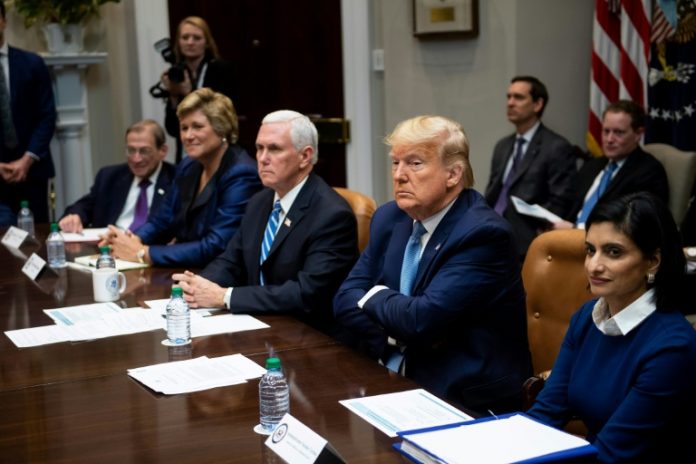President Donald Trump’s push for economic stimulus measures to combat market turmoil in the midst of the growing coronavirus crisis got a slow start Tuesday after talks with skeptical lawmakers.
The outbreak has prompted US airlines to cancel flights, the Federal Reserve to make its first emergency rate cut in 12 years and the stock exchange to experience its worst session since 2008, though some of that ground was gained back in Tuesday’s trading.
This spells trouble for the US economy but also threatens Trump’s reelection campaign, which is based heavily on his touting of booming stock prices and low unemployment.
Trump promised to announce “major” economic measures on Tuesday and he made a rare trip to Capitol Hill for talks with his Republican party lawmakers.
The biggest item on his wish list is a cut in payroll taxes. But even allies in Congress and reportedly some aides in the White House are skeptical, questioning the cost.
By day’s end there was a notable lack of detail about Trump’s entire relief plan, especially how the tax cut would be funded.
“Let us put the proposal out in concrete details,” Trump’s economic advisor Larry Kudlow told a news conference, asking for more time when pushed to explain.

Trump says he wants to help hourly employees and small businesses, which could be hurt most by the need to take time off for quarantine or treatment in case of coronavirus infections.
Measures are also being proposed to include aid for workers in the gig economy who worry about calling in sick.
The administration earlier in the day unveiled steps to help airlines and the cruise industry and agreements by insurance companies to waive copay charges for people seeking tests for the virus.
Given the emphasis on quarantine to keep people from spreading COVID-19, paid sick leave is seen as particularly important, yet is not guaranteed in the US.
“The vast majority of low wage workers have zero paid sick hours,” said Arthur Wheaton, a professor at Cornell University who specializes in labor.
“The most vulnerable or precarious workers in the country have the least protections or security in case of sickness or emergencies,” he added, arguing that workers in the gig economy – drivers for delivery companies or ride-sharing services – are even worse off.
Fight for $15, an organization representing McDonald’s workers, called on the fast food giant to provide paid sick leave to workers whose immediate relatives show symptoms of potential infection and to keep paying workers even if they end up quarantined or if the outbreak requires a restaurant to shut.
With few employees and sensitive to drops in demand, small businesses are also seen as vulnerable.
“Business cycles usually hit small retail establishments and restaurants… relatively lightly compared to heavy industries. This one, I think, is going to be the reverse,” Alan Blinder, a former Fed vice chair.

Amanda Ballantyne, national director of The Main Street Alliance, which works with small businesses, said employers are asking for expanded unemployment benefits or other forms of direct support.
“There’s a feeling of unpredictability and anxiety. Some businesses have already started contemplating temporary layoffs,” she said, adding “there’s a real need for some kind of stimulus money and emergency support.”
Fears for the wider US economy are real: in a report last week, the Fed said the virus has already disrupted travel and access to goods for US industry, and businesses are fearful it may get worse.
Investors expect the Fed to cut the benchmark borrowing rate again at the March 17-18 policy meeting to stem the economic uncertainty.
Trump’s talk of a tax cut has meanwhile been condemned by the Democratic opposition and also by some economists.
“A payroll tax cut is the politically most expedient way to shovel money to those who need it least,” tweeted Justin Wolfers, an economics professor at the University of Michigan.
















